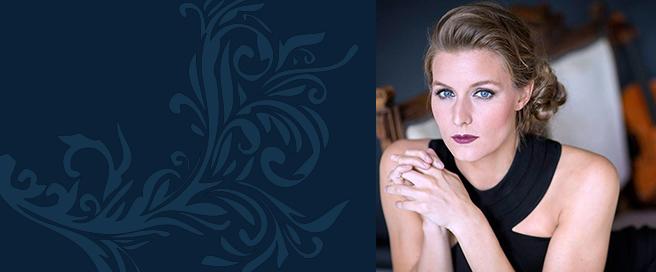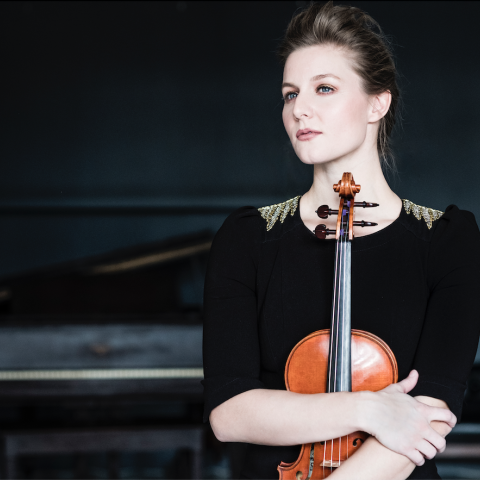Teacher Spotlight: Rachelle Puccini, violin

January 2nd, 2015
Interview by Erin Cano
Rachelle Puccini has been a Suzuki violin instructor at MIC since 2007.
What inspired you to become a Suzuki teacher?
There is often a misconception in this part of the world of what it means to be or how to become a musician; the work, discipline and lifestyle it involves. When I saw how the Suzuki method could effectively communicate this level of dedication and craft to the community at large, I was enthralled. I think there is no better way to nurture our students and community in becoming not only successful musicians, if they choose, but also creative, valuable members of society. Not growing up in the Suzuki community myself, I had to work much harder to gain the skills that were second nature to my Suzuki-nurtured peers. I teach my students to appreciate the environment I didn’t have, because I know how hard it can be to compensate for a rough beginning.
What is your favorite piece to teach?
I don’t have a favorite piece to teach, however there are a few that I look forward to especially. I love to teach Gossec Gavotte, Witches’ Dance, Humoresque, La Folia, and really any concerto in its entirety. I love taking students on such an epic journey through learning a standard concerto. They always come out the other end a different player and person, and I must admit I always learn or appreciate something new about the piece which I apply to my own playing and understanding of the work. The process is extremely fulfilling from all sides. I also love to teach Bach, from the very first minuet all the way to the sonatas and partitas. I find there is something so fundamental in all of it, the way the harmonies are structured, and how he thought of the violin in every way, there is just so much! So many aspects of playing the violin well are present in Bach; intonation, learning how to hear all harmonies present and implied, sound, balance, string crossings, and coordination. It’s all so important in building a strong violinist.
Which of your teachers inspired you the most? How have you integrated their style into your teaching?
All my teachers have played such valuable roles in making me who I am today. I am grateful for each one of them! The two that stand out the most for me are Dylana Jenson and Olga Kaler. With the first, Dylana, I can honestly say I would not be playing the violin without her in my life. She changed everything about my playing, and is without a doubt one of the greatest musicians I have had the privilege of knowing. To see the violin from her perspective was inspiring and opened up an understanding within myself that I wouldn’t have discovered without her guidance. There are still moments when I am practicing today that I finally understand some of the things she said to me. I occasionally still play for her. She has been constantly supportive of my playing and career, whether it be with instruments, her time, recommendations, or teaching advice; she is a wealth of inspiration and love. The idea that a violin teacher could be like “family” was new to me before Dylana, and that is something I try to give my students. Each student needs you in different ways, so your relationships with each individual person will always be different. Dylana really taught me what it meant to “give” to a student, and sometimes what a person needs to become a better violinist has nothing to do with the violin.
Olga Kaler has been a more recent figure in my life. Studying with someone after college isn’t something that everyone does. I must admit that I felt a little self-conscious about it at first, but I sought out Olga because I wanted more from myself. Not only does Olga understand all aspects of violin playing, but also she always explained things in a way that made it so clear to me. From her I learned how to execute what I want on the violin, not by accident, but because I know why what I am doing works or doesn’t work. Her knowledge of the repertoire is vast, and I enjoy watching her teach when possible. She is someone I will always look up to, as a violinist and a person. Pedagogically, Olga is a part of every lesson I teach. I explain to my students the reasons why what they are doing works or doesn’t, so they can reproduce the results on their own. There are so many aspects to playing the violin well. As a teacher you have to systematically explain each one in great detail many, many, many times over and in different ways. Olga has taught me how to do this effectively and in a nurturing way, without compromising a standard of excellence.
You perform regularly with many chamber ensembles and orchestras. What is one of the most interesting concert experiences you've had?
Whether I am playing a solo recital, concert with string quartet or sitting in an orchestra, my favorite moments are when I can make music with friends. Music is such a wonderful and mysterious thing; it transcends science and has the power to change the world. When you make music with people, I honestly believe we have the opportunity to communicate with one another on a level that cannot be entirely explained. One of my favorite things to do when I am working on a concert where others are involved is to imagine how much time, energy and effort went into making each person who they are at that exact moment. To think about the combined efforts of all of those people making music together on one stage in that same moment is truly incredible. In this way, I feel every concert I play is special.
What do you enjoy doing in your free time?
Free time is a luxury, so I have a rule for myself - if I do not have a concert or rehearsal on Thursday nights, I will go to a ballet class. I love practicing ballet. I started very late in life. When I was in college, I was playing in the pit for the ballet Pulcinella. I looked up at the dancers and thought, “I must do this!” I joined an extra-curricular adult beginning ballet class with the director of the dance department later that week, and in the following year was already allowed to take technique and pointe classes alongside the dancers in the mornings every day. I loved it! It’s such a different way to experience music, and I try to make it a part of my week if at all possible.

